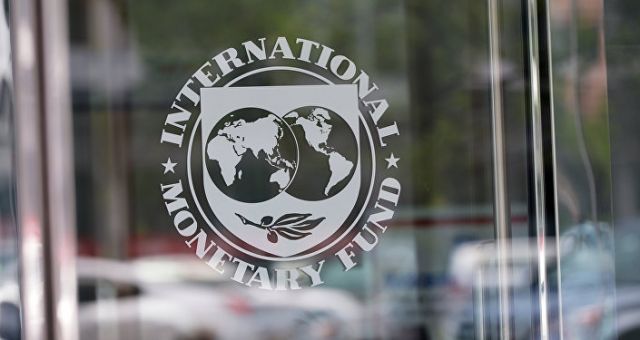The IMF Dread Resistance to Globalization (Video)
(N.Morgan) A highly revealing statement made by Louis Kuijs, a former official with the International Monetary Fund (IMF) and current head of the Asia Economics at Oxford Economics in Hong Kong, exposes the deep awakening taking place around the globe.
Kuijs said, “The backlash against globalization is manifesting itself in increased nationalistic sentiment, against the outside world and in favor of increasing isolation.”
As the IMF policymakers gathered on October 7-9 in Washington, D.C., for the annual meeting of the IMF, based on those meetings, it was obvious that the World Bank was deeply concerned about recent unfolding events which could affect their pending agendas.
One of the major issues facing the globalists’ agenda is that countries around the world are now recognizing the existence of a one world economy would destroy national sovereignty.

The IMF’s stated purpose is the construction of an international payment system based on the American dollar, and the promotion of international trade.
The integration of all nations’ economies, occurring since WWII, has been the prime ambition of the elites.
However, several components have converged recently to threaten that objective.
This includes the realization for a growing number of countries that globalization is actually disrupting national economies rather than being a benefit, and that national sovereignty is being lost as a result of so-called free trade deals.
When Britain voted to exit the European Union (EU) this summer, it delivered one of the most devastating blows suffered in decades against the crusade for a one world government.
The surprising nomination of Donald Trump and his “America First” campaign was largely due to his opposition to trade deals that diminish American national sovereignty.
The IMF released its latest World Economic Outlook on Tuesday of this past week, arguing that the anti-trade movement will further threaten a world economy plagued by stagnant wages.
Interestingly, the Outlook indicated that U.S. economic growth is lagging behind world economic growth.
The Outlook is predicting an economic growth for the world economy of 3.1 percent for this year, but a mere 1.6 percent for the economy of the United States.
The World Bank is a United Nations associated institution that provides loans to developing countries.
While its stated goal is to reduce poverty, in its Articles of Agreement, it is clear that a commitment to international trade is the guiding principle of the organization.
Together, the IMF and the World Bank are the twin pillars of the world establishment.
Christine Lagarde, the managing director of the IMF, explained that both organizations are hoping to achieve two goals during this week’s meeting: first, to successfully resist the efforts to throw up protectionist barriers to trade, and second, to take action to increase global economic growth.
Unfortunately for those who control the IMF and the World Bank, trade deals are extremely unpopular around the world right now.
In the United States, both presidential candidates have publicly opposed the Trans-Pacific Partnership (TPP) trade deal.
The TPP is a 12-nation trade agreement endorsed by the Obama administration, with the stated goal of eliminating trade barriers between the signatory nations, which include Japan, Australia, Malaysia, and the United States.
While Trump has consistently condemned the TPP during his campaign, Clinton has flip-flopped, originally strongly in favor of the deal while secretary of state for President Obama, even stating that the TPP “sets the gold standard in trade agreements.”
The deal was intended to expand on the existing North American Free Trade Agreement (NAFTA), which the United States signed with Canada and Mexico during Bill Clinton’s presidency.
To date, Congress has failed to act on the TPP. However, there is a growing fear that it will be secretly pushed through during the lame-duck session after the November elections.
The opposition to globalization and the diminishing of national sovereignty is a world-wide issue that must be addressed.
European globalists are extremely worried after the British vote to exit from the EU, fearing that with elections next year in France, Germany and the Netherlands, such anti-EU sentiment might well spread and ultimately destroy the EU.
British Prime Minister Theresa May said this past Sunday that the United Kingdom will begin the process of formal withdrawal from the EU early next year.
China has cause for concern with the anti-trade agreement sentiments sweeping the West.
Daiwa Capital Markets estimates that a trade war would eliminate as much as five percent of China’s gross domestic product.
While the communist regime ruling China has enjoyed the supposed “free trade” policies of the elites that dominate the IMF and the EU, they have refused to open many of their own industries to imports.
What spawned this growing opposition to globalization and the integration of the world economy?
A former senior fellow at the Peterson Institute for International Economics, John Williamson, blames the 2008-2009 financial meltdown.
“There was agreement on globalization before the crisis and that’s one thing that’s been lost since the financial crisis.”
The advocates of globalization are the same people who supported the policies that led to the financial meltdown of 2008 to begin with.
Former IMF chief economist Olivier Blanchard wrote a policy brief for the Peterson Institute in which he expressed amazement at, “how anemic demand remains in the face of zero interest rates.”
However, these are some of the very same policies (central banks driving down interest rates below their market level) that led to the financial meltdown, and that have have continued to contribute to a lack of confidence in the ability of the same elites, who have pushed for globalization.
Ludwig von Mises of the Austrian economics school predicted the Great Depression of 1929, in his opposition to a similar policy at that time by the Federal Reserve System.
More recently, other Austrian economics school advocates including Ron Paul have correctly predicted that the same thing would happen in 2008, as a result of the “easy money” policy and low interest policy of the Federal Reserve.
The solution to economic stagnation is not repeating history over and over, with artificially low interest rates and trade deals that benefit communist regimes such as China while reducing both the national sovereignty and the industrial base of Western countries — but rather a free market economy in which all nations of the world can participate.
That, however, is not what is desired by the IMF elites meeting this past week in Washington.
They are concerned that their grip on power may be slipping.
For those who wish to preserve the national sovereignty of the United States, this should be a beacon of hope.

References:
http://www.thenewamerican.com/economy/item/24214-elites-fear-backlash-against-globalization
http://feeds.reuters.com/~r/reuters/topNews/~3/vlqnn-WeNmk/us-imf-g-idUSKCN12629J
http://www.imf.org/external/am/2016/
